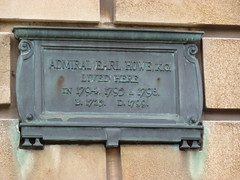Sir Admiral of the Fleet Earl Richard Howe KG


Sir Admiral of the Fleet Earl Richard Howe KG
(1726-1799)
Member of Parliament (1757-1782), Rear Admiral (1770-1776), Commander-in-Chief, Mediterranean Fleet (1770-1774), Vice-Admiral (1776-1782), Commander-in-Chief, North American Station (1776-1778), Royal Navy Admiral (1782-1790), 1st Viscount Howe (1782-1799), 1st Earl Howe (from 1788), 1st Baron Howe (1788-1799), Admiral of the Fleet (from 1796), and 620th Knight of the Order of the Garter (from 1797)
Commemorated on 1 plaque
Admiral Earl Howe. K.G. lived here in 1794, 1795 & 1798. B.1725. D.1799.
William Street, Bath, United Kingdom where they lived

